Top footballers have been paid using an offshore company in Uruguay to play with Lionel Messi during charity matches, set up in 2012 and 2013 by the Barcelona forward''s foundation
Although cash from the matches was destined for Syrian refugee children, 1.5 million USD from these high-profile friendlies evaporated into tax havens
Police in Madrid wanted to open a major international investigation to probe the financial flows from the games
But a Barcelona judge dismissed the case, and some police investigators wondered whether Messi had been “covered from above”
Football Leaks investigation by Rafael Buschmann, Michael Wulzinger, Nicola Naber (Der Spiegel) and Yann Philippin (Mediapart) for EIC Network
This version by The Black Sea
More here on Messi''s Charity Foundation Controversy
By%20%d0%94%d0%bc%d0%b8%d1%82%d1%80%d0%b8%d0%b8%cc%86%20%d0%a1%d0%b0%d0%b4%d0%be%d0%b2%d0%bd%d0%b8%d0%ba%d0%be%d0%b2%20(soccer.ru)%20(1).jpg)
2015. Madrid. The Spanish police were preparing to launch a major international investigation into alleged tax fraud, targeting the Argentinian striker Lionel Messi, his father and agent Jorge Messi, as well as three of his teammates from FC Barcelona.
The group were under a probe for allegedly receiving undeclared income for participating in friendly games organized in the Americas in 2012 and 2013, under the auspices of the Lionel Messi Foundation for children in need.
But on 14 December 2015, a Barcelona judge ruled that the allegations could not be substantiated.
This decision appears surprising after reading the case report by the Unidad Central Operativa (UCO), an elite police unit of the Guardia Civil in Madrid, which we reveal today.
In this confidential document dated 3 December 2015, obtained by Der Spiegel and analyzed by Mediapart and its partners in the European Investigative Collaborations (EIC) network, the investigators argued that the probe should continue, given “the relevance of the facts under investigation and the seriousness of the crimes likely that have been committed […]”.
The UCO did not find evidence of payments to the Messi clan. But the police have accumulated disturbing elements. The Messi foundation does not seem to have earned money from the operation, but 1.5 million USD from these so-called 'Messi y sus amigos' (Messi and Friends) matches were transferred to offshore accounts in the Caribbean state of Curacao, known as a tax haven, and Hong Kong.

In the conclusion to their report, the police ask the Barcelona judge to launch international rogatory commissions - requests to a foreign court for judicial assistance - in eight different countries.
These were aimed to track the money flows and identify the final beneficiaries of the offshore transfers. The investigators also asked for access to tax records of the four-time Ballon d’Or winner and his foundation since 2011.
The judge refused. Several police officers at the Guardia Civil believe that Lionel Messi was “covered from above” in this case - but they have no evidence.
This police report and other exclusive documents passed to Mediapart and the EIC by Der Spiegel, including from Football Leaks, reinforce concerns around these matches, which backs up reports already published in 2013 by Spanish partner El Mundo.
These documents show that the 'Messi y sus amigos' operation was secretly conducted by an offshore structure called Players Image SA, registered in Uruguay.
But the level of cash from these games for charity is pathetic. The Messi family accepted that Players Image SA would give only three per cent of proceeds from the ‘Messi and Friends’ matches to its foundation.
But it is understood that the same Uruguay company, which earned around seven million USD from contracts connected to the games, generously paid some of the 'Amigos' stars to participate in the charity matches.
On the other hand, the children whom the ticket-buying fans thought they would help have hardly seen any cash. Unicef received only 300,000 USD from the Messi Foundation in 2013, but it is unclear if this money came from the 'Messi y sus amigos' operation.
Contacted by EIC, Rodrigo Messi, elder brother of the player and president of the Leo Messi Foundation in Barcelona (FLM), refused to answer our questions.
“Spanish courts have already dismissed the case of the Messi & Friends matches, ruling that neither Mr. Lionel Messi or the [Foundation] were involved in [organizational] matters and that they had not received payment from those events,” he stated.
The games started in June 2012, when Lionel Messi flew to Cancun (Mexico), Bogota (Colombia) and Miami. There was another tour the following summer in Medellin (Colombia), Lima (Peru) and Chicago.
The advertising posters boasted: 'The Fight of Stars: Messi and his Friends against the Rest of the World.'
The price? 55 USD minimum for a seat in Chicago; 1,200 to 2,500 USD depending on the country for a place with the VIPs, including a shirt signed by the Barça forward.
But it was for a good cause: the profits were destined to fund the Messi Foundation and several local NGOs, with a view to aiding Syrian refugee children and kids with incurable diseases in Argentina.
Messi gathered an impressive bunch of stars on the field: his Barça teammates Pinto, Dani Alves and Mascherano; Neymar and Edinson Cavani; top strikers James Rodríguez and Radamel Falcao, and a slew of old glories from French football: Thierry Henry, Florent Malouda, Didier Drogba and Eric Abidal.
According to our confidential documents, the Uruguay-based company chosen by the foundation to organise matches, Players Image SA, paid for their plane tickets and accommodation, “on terms negotiated with each of them”.
As charity does not exclude comfort, Lionel Messi and his relatives were entitled to a private jet and nights in five-star hotels, funded by ticket sales. But officially, nobody received money.
The Spanish police report points out the “the disastrous organization” of the matches and “the lack of involvement by the organizers”. In Cancun, the stadium was only half full because of the “high ticket prices”.
In Colombia, families with children delayed the match by 90 minutes with a demonstration because they did not have the shirts with a Messi autograph to which they were entitled.
Even worse, some NGOs had not received the promised donations.
The scandal broke out in December 2013 when Spanish daily El Mundo revealed that the Unidad Central Operativa (UCO) opened an investigation into 'Messi & Friends', following a lead from Columbia.
A cartel of Mexican drug traffickers allegedly used the charity operation, without the Messi clan being aware, to launder money through the matches, thanks to the purchase of tickets located at “row 0”, which was a fictitious spread of seats.
The key man in the case is Argentina's Guillermo Marin. The boss of a sports marketing agency in Buenos Aires, Marin is a major business figure in Latin American sports, where he negotiated sponsorship deals for Lionel Messi and other top players. He is close to Jorge Messi, the player's father, who manages the footballer's business and foundation.
Marin is probably most renowned for organising a race in the center of Buenos Aires between 100-metre record-breaking sprinter Usain Bolt and a bus.
Marin won the right to run the 'Messi & Friends' matches from the Leo Messi Foundation, and he subcontracted the organization to local companies. One of these was headed by the Colombian Andres Barco, a man suspected of helping the narcos launder their money through the match held in Bogota.
Thanks to wiretaps, the UCO investigators come across a revealing phone conversation. Two employees of Barco explain that their boss needs to pay “four melons” (a euphemism for four million in cash) to Guillermo Marin to pay players in Bogota.
“It has never been a charity match,” confirmed a witness to the investigators, who says that this payment amounted to five billion Columbian Pesos (2.2 million USD at the time).
A few months later, Andrés Barco told El Mundo and the police that he paid 1.37 million USD to an offshore account in Curaçao, at the request of Guillermo Marin.
Barco added that he “could not know why Messi's representative [Marin] wanted this money”. He said to the UCO investigators that he paid all the expenses of the game (2.2 million dollars, including 100,000 USD for the players' plane tickets) and sent the Money to Marin.
The UCO police report reveals another suspicious payment, this time related to the Medellin match in Columbia. The local organizer transferred, through an American bank, 120,000 USD to an account in Hong Kong.
This account is controlled by a shell company named Roskella Trading registered in the British Virgin Islands, one of the most opaque tax havens on the planet.
Heard as witnesses by the investigators, Lionel Messi, his father and his Barça teammates strongly denied any allegations of wrongdoing. They say they have not been paid at all. The Leo Messi foundation of Argentina gave 300,000 USD to UNICEF in 2013 after the tour. But does this money really come from the charity matches?
It was transferred to Unicef by the Leo Messi Foundation in Argentina. However proceeds from the 'Messi and Friends' matches were destined for the Barcelona-based Leo Messi Foundation, which is a separate legal entity.
An unsigned version of the contract between the Messi Foundation of Barcelona and Guillermo Marin shows that the financial scheme was, from the start, far from charitable.
Marin admitted to the UCO that the contracts signed with the local organizers stated that his company would receive 12.3 million USD. However, Marin’s contract with Messi’s charity states that he has to give back only 300,000 USD (50,000 USD per game) to the foundation, which is less than three per cent of the expected revenue.
It is surprising, to say the least, that the Messi clan accepted a deal so unfavorable to their charity work.
This is not the only anomaly. Officially, the matches were organized by Imagen Deportivo, Marin’s official sports marketing agency in Buenos Aires. Even the police think so.
But, according to the draft contract, the foundation was contracted with the structure controlled by Marin: Players Image SA, registered in Uruguay, a notorious tax haven, nicknamed “the Switzerland of Latin America”.
This is the same company mentioned in the tax fraud case for which Lionel Messi was convicted in 2016. Players Image SA negotiated two of the sponsorship agreements (with Pepsi and Telefonica), whose revenues were concealed in a tax haven by the star and his father.
Why did the intermediary of the Messis need to use such an offshore structure to manage the money from charity matches? To avoid taxes? Hide financial flows? He did not answer questions on these issues when confronted by EIC.
.jpg)
In front of the police in the UCO, Guillermo Marin declared that his company received only seven million USD from the operation, instead of the 12.3 million USD originally planned. He admitted that part of the money was used to pay players, without mentioning names or amounts.
His contract with the foundation states that he was in charge of “recruiting” players. But this did not stop at footballers. He was generous to Fabio Capello, who was acting as a kind of coach for a made-up team.
As we revealed during the Football Leaks, the Italian coach obtained 75,000 USD for three matches, a sum eventually reduced to 50,000 USD because one game was cancelled. Capello’s representatives sent the invoice to the offshore company Players Image SA.
This means that the money paid by more than 1,000 spectators has exclusively been used to pay the former coach of Juventus, AC Milan and England. Is it moral to get so much for a match destined to relieve the suffering of Syrian children?
Capello's lawyer did not answer, just stating that these revenues have been declared to the tax authorities.
Guillermo Marin was ready to spend ridiculous sums to recruit top players, as reveals news magazine Der Spiegel. In the Spring of 2013, Marin's collaborators contacted the agent of Robert Lewandowski.
The Polish striker of Borussia Dortmund had just risen to the rank of world star, after scoring four goals against Real Madrid in the semifinals of the Champions League (4-1).
Guillermo Marin wants him. “Our basic package consists of two business class tickets per player, accommodation in a five-star hotel, and a sum of money,” writes his staff to Lewandowski’s agent.
Marin’s guys present themselves as working for the agency Imagen Deportivo in Buenos Aires, but the draft contracts sent by email were to be signed by Players Image SA, the offshore company in Uruguay.
The initial proposal is 30,000 USD. Lewandowski refuses. Marin's team goes up to 90,000 USD. Then 110,000. And finally 250,000. Yes, 250,000 dollars to play a charity match. To stop the auction, Lewandowski's agent stopped picking up when an Argentinian number appeared on his phone.
Who are the 'Amigos' who hit the jackpot? Mediapart contacted all the players linked to France. In theory, they should have been proud to have done charity work with Lionel Messi.
But they all remained silent.
Edinson Cavani refused to answer. Neymar, Radamel Falcao, Ezequiel Lavezzi, Thierry Henry, Florent Malouda and Eric Abidal did not respond.
The press officer of Didier Drogba, the former Olympique de Marseille and Chelsea striker, “thinks that a donation was made to the foundation of Didier in exchange for his participation in the match.”
After two years of investigation, the Madrid police accumulated many troubling elements. On 3 December 2015, they ask in their final report for international investigators to trace the financial flows through different countries, including the 1.5 million USD transferred to Curacao and Hong Kong.
Because there is a suspicions of tax evasion, the judge looking into the case had to be from Messi's place of residence - which is Catalonia.
Before making her decision, the Barcelona judge who inherited this case wanted to hear from Guillermo Marin. He was the organizer of the matches chosen by Messi and the person at the heart of offshore scheme.
In her conclusion, quoted by Spanish newspaper El Confidencial, the judge states that Marin's “long and detailed” testimony undermined the suspicions of the police.
Marin reiterated that Lionel Messi and his Barça teammates have not been paid. He added that the organization's (real) fiasco and the lack of success of the operation resulted in “economic losses” for his company, given the “high expenses incurred in various participated in the events”.
The businessman admitted that he had paid some players, but only those who were not among the richest (this seems to contradict the strategies used on Lewandowski and Capello detailed above).
The judge concurred with Marin, pointing out that the last match in Los Angeles was canceled due to lack of money. Regarding the Leo Messi Foundation, the magistrate emphasized “that it could not be determined whether [the charity matches] could bring money” and that the project “was lost” for the foundation because of economic difficulties.
The judge concluded that “there is no evidence of tax evasion by Lionel Messi and/or the Leo Messi Foundation”. At this stage of the investigation, this was accurate. But the judge did not want to allow a further probe.
As she refused to order international investigations into cash flows, she made it impossible to know if the millions generated by the 'Messi y sus amigos' were lost for everyone.
CNNTürk''te yayınlanan Gece Görüşü programının sunucu ve katılımcıları Erdoğan ailesi hakkında yazan gazetecilerin resmi makamlarca soruşturulmasını istedi. Cevabımızı yayınlıyoruz.
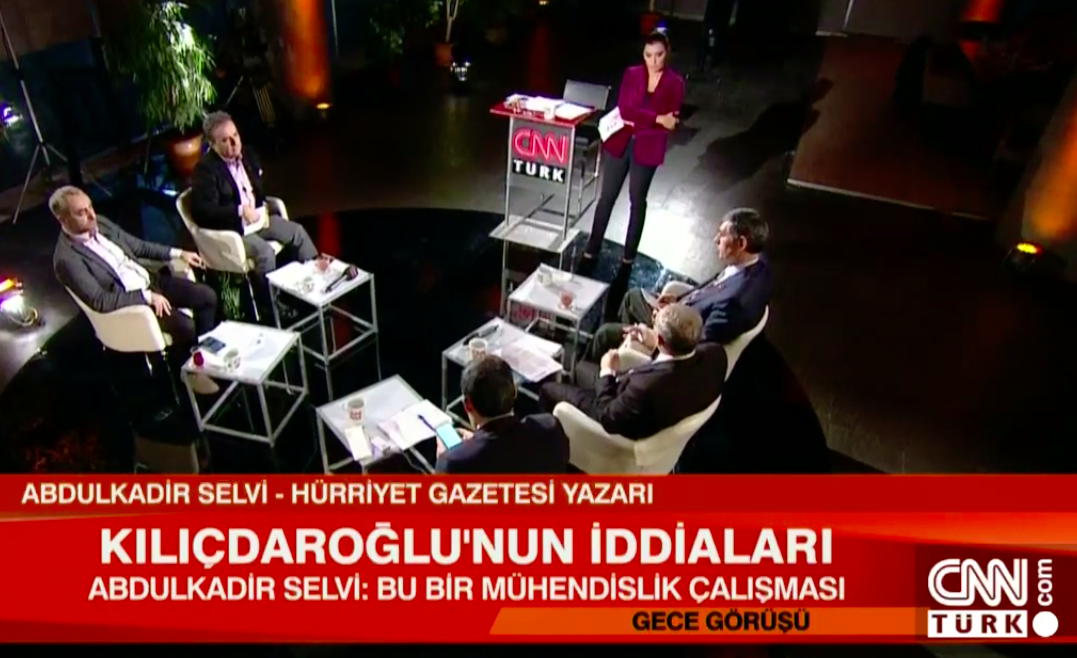
30 Kasım akşamı, sunucu Hande Fırat ve programa çağırılan beş panelist CNNTürk’te Gece Görüşü adlı programda, CHP tarafından ortaya atılan ve Erdoğan ailesini ilgilendiren 15 milyon dolarlık para transferi skandalını tartıştılar.
Programın katılımcıları İsmail Saymaz, Gürkan Hacır, Nevzat Çiçek, Abdülkadir Selvi ve Orhan Karataş’tı.
Program boyunca Saymaz ve Hacır dışındaki yorumcular ve Hande Fırat, The Black Sea’nin karanlık güçlerle, yabancı istihbarat örgütleriyle ve de FETÖ’yle işbirliği yaptığını ima ettiler.
Yaptıkları hiçbir yorumun kanıtı yoktu. Saymaz da dahil olmak üzere Hacır dışındaki tüm yorumcular ve sunucu Fırat, sitemizin ve gazetecilerinin resmi makamlarca ve savcılık tarafından incelenmesi gerektiğini beyan ettiler.
Programda ağırlıklı olarak bahsedilen konu Kılıçdaroğlu’nun Erdoğan ailesinin offshore işleri hakkında yaptığı açıklama ve sonrasında internet sitelerinde paylaştıkları belgelerdi.
The Black Sea’nin bu skandala dahil olmasının sebebi ise CHP’nin belgelerinde adı geçen Bellway Limited adlı Man Adası’nda kurulu şirketti.
Mayıs 2017’de yazdığımız haberde bu şirketin de adı geçiyordu.
Bellway Limited’in, 25 milyon dolar değerindeki Agdash adlı petrol tankerinin gerçek sahiplerini gizli tutmak için kurulan bir offshore şirketler ağının parçası olduğunu yazmıştık.
The Black Sea’nin haberine göre, Sıtkı Ayan ve Mübariz Mansimov adlı iki iş adamı Agdash adlı gemiyi Erdoğan ailesine bir nevi hediye etmişti. Erdoğan’ın eniştesi Ziya İlgen’in imzası bulunan belgeler İlgen’in bu offshore ağının ve geminin asıl sahibi olduğunu gösteriyordu.
Haberimiz Malta Files (Malta Dosyaları) projesinin bir parçasıydı. The Black Sea bu projede European Investigative Collaborations (EIC) adlı uluslararası gazetecilik ağıyla beraber çalıştı. Bu ağın kurucu üyelerinden olan The Black Sea haricinde EIC üyesi olan medya ise şunlar: Der Spiegel (Almanya), Mediapart (Fransa), NRC (Hollanda), El Mundo (İspanya), Le Soir (Belçika), L’Espresso (İtalya), Expresso (Portekiz), Nacional (Hırvatistan), Dagens Nyheter (İsveç) ve Politiken (Danimarka).
Malta Files projesinde 16 ülkeden 49 gazeteci çalıştı ve sonucunda onlarca haber yayınlandı. Türkiye haricinde projeden çıkan haberler içinde para aklamak için Malta’yı kullanan İtalyan mafyası, Belçika’nın vergi kaçıran zenginleri, güçlü Rus tefecileriyle ilgili olanlar da vardı.
Programın 30’uncu dakikasından itibaren panelist ve sunucu The Black Sea’nin Mayıs ayında yayınlanan Malta projesinden bahsetmeye başladılar.
Programı izleyene kadar haber sitemizin programda konuşulacağından ya da bu tür iddialarla karşı karşıya geleceğinden haberimiz yoktu ve kendimizi savunmamıza izin verilmedi.
The Black Sea’den bahsedilen süre içinde haberin kendisiyle ilgili tek kelime edilmedi. Onun yerine, bizim kim olduğumuzla ve Bellway-CHP skandalındaki rolümüzle ilgili ardı arkası gelmeyen spekülasyonlar yapıldı.
Bize yöneltilen iddialar ve imalar ise şöyleydi:
1- Türk devletine operasyon düzenleyen bir yabancı istihbarat örgütü parçası olduğumuz,
2- CHP’nin yayınladığı belgelerin kaynağı olduğumuz ve bir operasyon parçası olarak CHP’yi de manipüle ettiğimiz,
3- FETÖ’ye çalıştığımız ya da örgütün bir parçası olduğumuz,
4- Sadece Türkiye’yle ilgili bu haberleri yayınlamak için Mayıs 2017’de kurulduğumuz.
Bu iddiaların hepsi yanlıştır.
Program sırasında çevirmen yardımıyla yazdığım ve The Black Sea’nin kim olduğunu anlatan bir mesajı panelistlerden birine gönderdim. Yapmak istediğim, üzerinde konuştukları ve hiçbir kanıta dayanmayan spekülasyonlara bir son vermek ve kim olduğumuzu açıklamaktı.
Programdakilerle iletişime geçmemin çok faydası olmadı. Gönderdiğim mesajın Türkçe yazılması bile imalara sebep oldu. Tartışmanın sonunda panelistler ve sunucu Fırat, savcılık tarafından incelenmemiz gerektiği konusunda hemfikir oldular.
Türkiye devletinin ve yargısının içinde bulunduğu durum göz önüne alındığında, gazetecilerin ve bir haber sitesinin savcılık soruşturmasına dahil edilmesi gerektiğinin televizyon ekranlarından iletilmesi tam bir skandaldır. Fırat’ın sunduğu program ve o akşam ağız birliği eden katılımcılar gazeteciliğin yüz karasıdır.
Bu iddialara karşı, The Black Sea’nin kuruluşu ve nasıl bir organizasyon olduğuyla ilgili açıklık getirmek isterim.
The Black Sea (ilk adı Around the Black Sea’ydi), 2011 yılında Romanyalı gazeteciler Stefan Candea ve Petrut Calinescu tarafından seyahat blog’u olarak kuruldu. 2013 yılında devamlı güncellenen bir haber sitesi haline geldi ve o zamandan beri Karadeniz bölgesini kapsayan ülkeler (ve diğerleri) hakkında derinlemesine araştırma ve analiz içeren haberler yayınlıyor.
Grubun ana amacı; yetenekli araştırmacılar, yazarlar, fotoğrafçılar ve sanatçıları içine alan ve aynı zamanda ana akım medyanın haberlerini yayınlamadığı gazetecileri bir araya getiren bir topluluk olmak.
2013 yılından beri The Black Sea, adını alan Karadeniz bölgesi ülkeleri ve diğerleri hakkında haberler yayınlıyor. Haberlerin çoğunluğu Romanya ve Moldova (toplam 44 civarı haber) bölgeleri hakkında. Bunu Türkiye (14), Gürcistan (7), Ukrayna (5), Ermenistan (2) takip ediyor. Ayrıca Özbekistan, Kazakistan, Lüksemburg, Angola, Litvanya, İtalya ve hatta Sao Tome ve Principe Adası’yla ilgili de haberler yayınladık.
Editöryel olarak bağımsız olsak da, The Black Sea projesi Romanya Araştırmacı Gazetecilik Merkezi’nin bir parçası olmaya devam ediyor. Merkez, 2001 yılında kuruldu ve Avrupa’nın ilk araştırmacı gazetecilik topluluklarından biri. Aynı zamanda Araştırmacı Gazetecilik Küresel Ağı’nın (Global Network of Investigative Journalism) kurucu üyelerinden.
Romanya Araştırmacı Gazetecilik Merkezi’ne dahil olan gazeteciler arasında Uluslararası Araştırmacı Gazetecilik Konsorsiyumu (ICIJ.org) üyeleri de var. Merkezin gazetecileri ve The Black Sea’nin yayınladığı haberler aynı zamanda gazetecilik dünyasında iyi bilinen prestijli bir çok bursun ve ödülün de sahibi.
The Black Sea, ilk kurulduğunda ve hâlâ seyahat blog’u olarak faaliyet gösteriyorken kuruluş desteği olarak Alman Marshall Fonu’ndan yararlandı. O tarihten beri ana bir fonu ya da donörü bulunmamakta. Gazetecilerinin gönüllü çalışmaları ve bağımsız olarak aldıkları işleriyle sitenin gazetecilik fonlarından proje bazlı aldığı küçük fonlarla faaliyetlerini sürdürüyor.
The Black Sea, Malta Files projesi için JournalismFund’ın “sınır-ötesi gazetecilik” fonundan yararlandı.
JournalismFund’ın hangi projelere destek sağlayacağı araştırmacı gazetecilerden oluşan bağımsız bir jüri tarafından belirleniyor. Bu jüri, başvuruları haftalar boyunca inceledikten sonra son kararlarını veriyorlar. Bu jüriye JournalismFund’ın kendisinin ya da herhangi başka bir dış etkenin herhangi bir dahli yoktur. JournalismFund’ın bu konuda oldukça katı kuralları vardır.
The Black Sea üzerinde ne JournalismFund’ın ne de başka bir kişi veya grubun herhangi bir editöryel etkisi vardır. Hatta The Black Sea gazetecilerinin başvurduğu bir çok fon isteğinin reddedildiği de olmuştur.
The Black Sea gazetecileri ve Romanya Araştırmacı Gazetecilik Merkezi’nin geçmişine bakıldığında bir çok ülkede yolsuzluk, rüşvet, istihbarat örgütleri, kaçakçılık ve organize suçları haberleştirdiği görülebilir. Aynı zamanda Fetullah Gülen’i ve örgütünü de araştırdık; örgütün nasıl işlediğini ve devletin içine nasıl sızdıklarını anlattığımız haberler de yazdık.
The Black Sea, CHP tarafından yayınlanan belgelerin kaynağı değildir ve herhangi bir grup ya da partiyle işbirliği yapmamıştır ve gizli olarak belge paylaşmamıştır. Biz araştırmamızı haberleştirerek kamuoyuna sunduk.
The Black Sea’nin editöryel politikası adil ve dengeli olmaktır. Mayıs ayında haberimizi basmadan önce, Erdoğan’ın makamı da dahil olmak üzere tüm iddia taraflarına sorularımızı yönelttik ve yanıt verme haklarına saygı duyduk. Haber basıldıktan sonra herhangi bir tekzip ya da yasal tehditle karşılaşmadık.
The Black Sea, haberde yazılanların doğruluğunun arkasındadır.
Türkiye’nin içinde bulunduğu durum ve medyanın devamlı korkutulması ülkede araştırmacı gazeteciliğe büyük zarar vermiştir.
Gazetecilerin kendileri de zaman zaman devlet tarafından tehdit edilen meslektaşlarının arkalarında durmaktan ve onları savunmaktan imtina etmiştir.
CNNTürk panelistlerinin ve sunucusunun sadece haber yapma amacında olan meslektaşlarına karşı soruşturma başlatılması isteklerini milyonlara duyurması sadece ve sadece halihazırda ağır yaralı olan gazetecilik mesleğinin öldürülmesine yardımcı olmaktadır.
Mesleğin etik kuralları bir kenara bırakılmış, hiçbir bilgi doğrulattırılmamış, onun yerine program boyunca asılsız iddialar üzerinden, bize açık cevap hakkı verilmeden, dedikodu yapar gibi bir tartışma programı yapılmıştır. Bunu yaparken de Türkiye’de sadece güçlünün ve iktidarın yanında olarak hayatta kalabilen gazetecilik endüstrisinin devamına katkı sağlamışlar ve mesleğin asıl amacının güçlüye hesap sormak olduğunu tamamen unutmuşlardır.
Bazı medyanın ve gazetecilerin girdiği ve gelecekte kendilerini de utandıracak bu tutum, gazeteciliği öldürürken gerçeğin ortaya çıkarılmasını da engellemektedir — bu da zaten hükümetin, yolsuzluk yapanların, FETÖ gibi örgütlerin asıl istediğidir.
Participants in the Turkish branch of global U.S. media brand called for a criminal investigation into journalists reporting on Turkish President Erdoğan

On Thursday 30 November, television station CNNTürk presenter Hande Fırat invited five guests - journalists and columnists - to discuss a recent scandal regarding a 15 million USD cash-flow to the family and friends of Turkish President Recep Tayyip Erdoğan on her weekly debate show 'Night Vision'.
The panelists were İsmail Saymaz, Gürkan Hacır, Nevzat Çiçek, Abdülkadir Selvi and Orhan Karatas.
During the programme, both the panel and Fırat repeatedly accused The Black Sea of crimes such as colluding with ‘dark forces’, foreign intelligence agencies, and an organisation called Cemaat/FETÖ, which follows the self-exiled Turkish ex-preacher, Fethullah Gülen.
Cemaat/FETÖ is identified in Turkey as a terrorist group linked to the failed 2016 coup against the Erdoğan regime, and has a history of leaking (fake and genuine) documents designed to play political games and discredit its enemies.
These accusations were made without any evidence. Many of the panelists, including the host, concluded that The Black Sea and its journalists should be criminally investigated by a Turkish public prosecutor.
The CNNTürk show was prompted by a party group meeting held that day by CHP, Turkey's main opposition, where its leader, Kemal Kılıçdaroğlu, announced he was in possession of financial documents proving the President's family was involved in offshore business. The party has since released these documents to the public.
The Black Sea became involved in the scandal, and Thursday's debate, because the CHP's documents relate to a company called Bellway Limited, based in the Isle of Man.
We wrote about this company in May 2017 in an article ‘Turkish President Erdoğan's family in secret offshore ship deal’, available here.
Bellway Limited is the ultimate controlling company in an offshore structure that hides the ownership of a 25 million USD oil and chemicals tanker called the Agdash.
The Black Sea exposed how two businessmen, Sitki Ayan, and Mübariz Mansimov, appear to have purchased the Agdash for the Erdoğan family, and that President Erdoğan's brother-in-law, Ziya Ilgen, signed documents declaring he, personally, owned these companies and the Agdash.
Our story appeared in a larger project called the Malta Files, on which the The Black Sea worked with the European Investigative Collaborations (EIC) network - a partnership including Der Spiegel (Germany), Mediapart (France), NRC (Netherlands), El Mundo (Spain), Le Soir (Belgium) and L’Espresso (Italy), Expresso (Portugal), Nacional (Croatia), Dagens Nyheter (Sweden), and Politiken (Denmark).
Other project partners included MaltaToday and The Intercept.
The Malta Files produced dozens of stories and brought together 49 journalists in 16 countries. Their reporting relates to important figures and companies, including Russian loan sharks, the Italian Mafia, and members of the Turkish elite.
Around 30 minutes into 'Night Vision', the panelists and host began discussing The Black Sea's Malta Files reporting from May. We were not told in advance that our publication would be the subject of discussion or any accusations, meaning we had no chance to properly defend ourselves.
At no point over the next hour did the participants address the specific details of our reporting. Instead they each speculated about our identities while hurling false accusations about our role in the current 'Bellway/CHP' scandal.
The accusations against The Black Sea and its journalists included:
1. That we are 'dark forces' working with foreign intelligence to destroy and disrupt the Turkish state
2. That we are the source of CHP's financial documents and, possibly, engaged in attempts to manipulate or destroy the CHP
3. That we are allied with, or part of, FETO, identified in Turkey as a terrorist organisation
4. That we were set up in May 2017 only to publish reports and documents about Erdoğan and his family's offshore business
All these allegations are false.
During the programme, I attempted to contact two of the panelists, by Twitter and by phone. This was done in Turkish, with the help of a translator since I don’t speak Turkish. I made this move to clarify who was responsible for the reporting on the Erdoğan family's offshore activities and give information about who is behind The Black Sea.
Secondly, I wished to stop the programme participants' wild speculation from leading to the false and damaging conclusion that our publication was allied with FETO and/or foreign powers.
This intervention did little to help.
Despite my intervention, the panel and the host then unanimously called for an investigation into each of these allegations by the Ankara prosecutor (who is now set to probe CHP and Kılıçdaroğlu); allegations that the panel and host had themsleves fabricated during the programme, all completely without evidence.
CNNTürk is 50 per cent owned by Turner Broadcasting System Europe (and 50 per cent by the Dogan Media Group), and should thus abide by the ethical principles of its brand.
These state that “integrity and accuracy are of the utmost importance to the [CNN] brand, and systems are in place to maintain them. For example, stories are thoroughly reviewed by producers and particularly sensitive stories are reviewed further by a team of senior editors, standards and practices specialists, and lawyers before they are broadcast.” It seems that none of these principles were respected during the creation and broadcast of this edition of ‘Night Vision’.
To call for a criminal inquiry at a time when the Turkish state and judiciary does not respect the legal rights of journalists is scandalous. This entire programme and those involved are an embarrassment to journalism.
In response to this, we would like to set the record straight, and explain who runs the Black Sea and what our goals are.
‘The Black Sea’ (formerly known as ‘Around the Black Sea’) started in 2011 as a travel blog by Romanian journalists Ștefan Cândea and Petruț Călinescu. It became a regular website in 2013, and has since evolved to publish in-depth investigations and reportage from the Black Sea region and beyond.
Its main aim is to build a community of talented investigators and writers, coders, photographers, artists, as well as offering a space for journalists to publish important reporting which is too difficult to publish elsewhere.
Since 2013, The Black Sea has published reports in and outside its titular region: 33 stories relate to Romania, and the other articles refer to Moldova (11), Turkey (14), Ukraine (5), Russia (1), Georgia (7), Armenia (2), Slovakia (2), plus stories on Uzbekistan, Kazakhstan, Luxembourg, Angola, Lithuania, as well as Italy and Sao Tome and Principe.
Although editorially independent, The Black Sea website is a project of the Romanian Centre for Investigative Journalism, a non-profit based in Bucharest, set up in 2001. This is one of the first ever non-profit investigative centres in Europe and is also a co-founder of the Global Network for Investigative Journalism, itself established in 2003.
The Centre's journalists include members of the International Consortium of Investigative Journalists, and both the centre and The Black Sea reporters have been granted fellowships such as Nieman at Harvard, JSK at Stanford in the U.S., and at the Centre for Investigative Journalism in London.
The reporters and RCIJ/TBS have been the recipient of numerous investigative journalism awards and nominations. The Malta Files, including the reports into the Erdoğan family, is currently on the shortlist for the British Journalism Awards 2017 under the category of 'Investigation of the Year (Global)'.
The Black Sea was established using a grant from the German Marshall Fund, but has had no core funding since 2013. Its work is financed through the freelance work of its journalists, voluntary contributions, and small one-off project grants.
The Black Sea's work on Malta Files was financed with a "cross-border" grant from JournalismFund.
How Journalismfund chooses to spend its money is determined by an independent jury of investigative journalists who spend weeks assessing applications and select based on merit and feasibility. This is undertaken with no outside interference whatsoever and Journalismfund is scrupulous about this.
Neither Journalismfund or the jury has any influence or input into the editorial policy of The Black Sea or its content. The Black Sea-sponsored projects often fail to win funding from this source.
The Black Sea and the Romanian Centre for Investigative Journalism has a history of investigating governments, corporate corruption, intelligence agencies and organised crime without bias. We have also investigated Gülen activities in Turkey.
Neither is The Black Sea the source of the documents obtained and released by the CHP and we do not collude with the political party, nor have we shared any of our documents with them in private. We made our research public.
The Black Sea is a professional media organisation with a fair and balanced editorial policy. Before publishing the May 2017 article under debate in the CNNTurk broadcast, we contacted all the individuals cited and provided a right-to-reply. This included the Office of the President of Turkey. We received no subsequent complaints, demands for corrections, or legal threats.
The Black Sea stands by the integrity and accuracy of this text, and the honest intent in which it was written: to reveal the truth about the secret business of the family of the President of Turkey.
The current climate of fear for journalists in Turkey has all but destroyed investigative journalism, especially that which targets the government.
Journalists, too, have done significant damage to the industry by failing to defend each other when the state persecutes and intimidates the media, forgetting that those who today criticise and accuse journalists may one day need the support of their media colleagues.
For CNNTürk and its panelists to call for an criminal investigation into fair and balanced journalists undertaking honest work only helps the state kill off a trade that is already mortally wounded.
It failed to follow professional standards in verifying information, and instead made false accusations, spread gossip and criminalised journalism, all without providing a proper right-of-reply or evidence. In doing so, CNNTurk and its panelists are active and willing participants in the charade and weakening the journalism industry in Turkey, which only serves power.
Italy’s manufacturers have been checking out a relocation to Crimea, thanks to business trips organised by an anti-globalist party boss with ties to the Russian elite
By L’Espresso, shared with EIC Network and The Black Sea
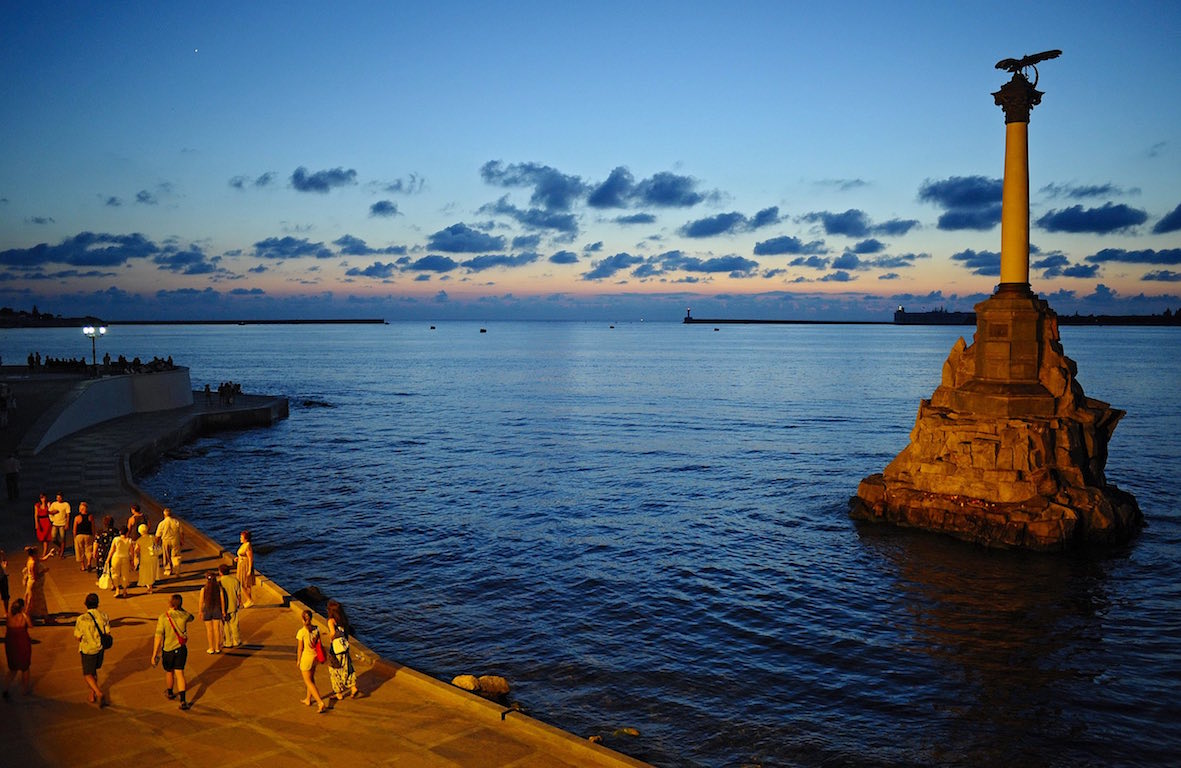
Italy faces a general election in early 2018 and a deluge of far-right groups are fighting for a place in a likely coalition Government.
One of the most controversial parties is Forza Nuova (New Force), run by a neofascist former fugitive, Roberto Fiore, who has strong links to Russia.
Fiore’s motto is 'God, Fatherland, Family, Work', and he campaigns for a new deal for Italy’s workers and small businesses, free from the threat of globalisation.
This follows the same mantra of national self-reliance trumpeted by Marine Le Pen’s National Front in France.
But, according to our colleagues at Italian magazine L’Espresso, Fiore has been organising business trips for Italian entrepreneurs to invest - not in their home territory - but in the contested Ukrainian region of Crimea, annexed by Russia in 2014.
Founded in 1997 by former fugitives from Italian justice, Roberto Fiore and Massimo Morsello, Forza Nuova ticks every box on the far-right ideological checklist: the party is anti-abortion, pro-Christian, anti-immigration, anti-same sex marriage, anti-NATO, Eurosceptic, and anti-capitalist. Plus it is also close to the Kremlin.
The party's roots are in the neofascist underground movement from the late 1970s, Terza Posizione, of which Fiore was a major ideologue. Terza Posizione was a front for guerrilla group Nuclei Armati Rivoluzionari (Armed Revolutionary Groups), which carried out dozens of assassinations.
On 2 August 1980, the city of Bologna was rocked by a suitcase bomb in its railway station that killed 85 people. Responsibility for the attack fell on Nuclei Armati Rivoluzionari, which denied culpability. Fearing arrest, Fiore fled to London, where he obtained refugee status.
While in the UK he became friends with Nick Griffin, who would later become leader of the far-right British National Party, and he built up a business in student travel.
But how did Fiore gain a home in the UK? According to a 1991 document written by the Consultative Commission on Racism and Xenophobia in the EU, Fiore “had been an agent with the British Secret Service (MI6) since the early '80s” - an allegation Fiore denies.
In 2000, he returned to Italy to take charge of Forza Nuova, alongside Massimo Morsello. When Morsello died a year later, Fiore secured his place at the top.
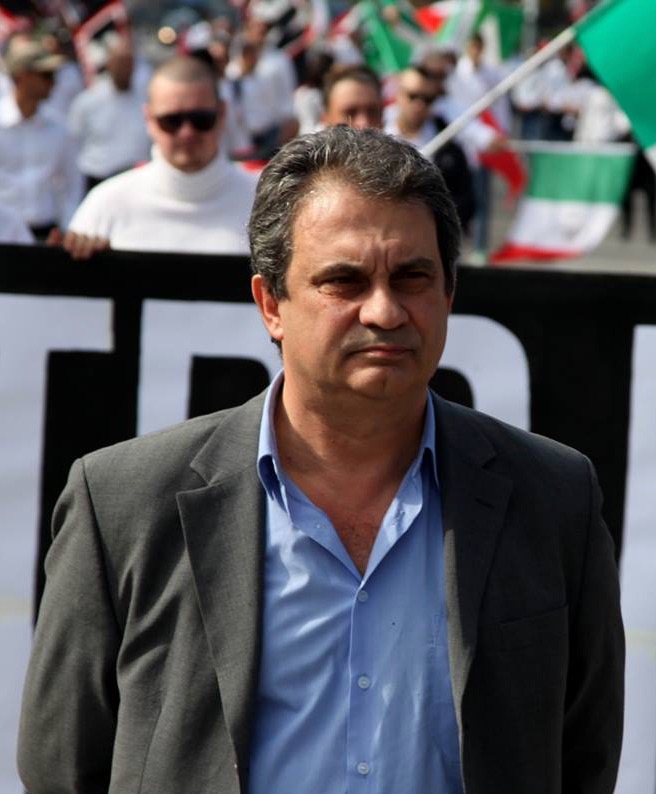
Fiore is an admirer of Vladimir Putin and has been a regular visitor to Russia on official delegations. His party's vehement anti-NATO, Eurosceptical and Christian fundamentalist line is close in spirit to that of Putin’s United Russia party.
In 2015, Fiore participated in the Conservative Forum in St. Petersburg alongside Europe's senior neofascist leaders. According to intelligence sources, in exchange for help for the Russian cause in Europe, extremist movements did “receive [Russian] economic support”. There is no proof that Forza Nuova gained cash from Russia.
But the relationship goes back before then - Fiore went on an official visit to Russia in 2012 for a two-day meeting called ‘Russian-Italian Trade Dialogue’ in Nizhny Novgorod, a large industrial city 400 km east of Moscow.
The summit programme stated that Fiore was there in a new capacity - that of director of the Italian-Russian organisation, Associazione Alexandrite.
In February 2014, following the revolution in Ukraine against a pro-Russian administration, Russia moved to take over the Crimean peninsula.
In a near-bloodless coup, the region fell under Putin’s control. But the Kremlin was left with a problem: Crimea was poor, isolated from Russia by water, and its already weak economy was facing decimation following the break from Kyiv. To keep the territory would cost Russia billions of dollars in subsidies.
What was the solution?
Foreign investment.
Russia opened an investment portal in English promoting a Free Economic Zone in Crimea. The peninsula was to become Russia’s own tax haven.
Russia’s propaganda machine boasted of plans by Italians to invest 300 million Euro in Crimea’s wine industry, and 250 million Euro from Germans in recycling, hotels and tourism. This is despite both Germany and Italy recognising Crimea as territory belonging to Ukraine - and not Russia.
In 2014, Fiore's Associazione Alexandrite organized business trips for Italians to Russia - and the delegation headed straight to Crimea.
Interestingly, Fiore’s name was no longer visible on official documents relating to the association at that time.
But businessmen who participated in those meetings state that everything was run from Italy by the Forza Nuova boss, who went on to orchestrate a second delegation to Crimea in 2015.
“A friend introduced me to the association, of which I knew Mr. Fiore was the president,” says Diego Ebau, a small business entrepreneur from Sardinia, who participated in the trips. “My goal and that of other dozens of companies who were there was not political. We just wanted to know more about the benefits of investing in Crimea.”
According to Ebau, if he invested at least 50,000 Euro in the peninsula, he would pay zero taxes for the first five years and enjoy a six per cent cap on taxes thereafter.
What could be more inviting for investors suffering from Italy’s labyrinthine tax regime, and the country’s incessant recessions?
But encouraging Italian firms to set up shop in Crimea is an odd move for this neofascist party, because at the core of its ideology is the defence of economic sovereignty, and a hatred of globalisation due to its threat to Italian micro-businesses.
Now some companies from Fiore’s Crimea trips have plans to shut down their factories in Italy and reopen them in Crimea.
“I left the Alexandrite Association after two trips, because I prefer to do things on my own,” says Ebau, “but I know that a Puglia textile company is already in the process of moving production over there. And to tell the truth, I have plans myself: together with another Sardinian entrepreneur, we are looking to open a marble processing company in Crimea.”
Original article in Italian by Andrea Palladino, Giovanni Tizian, and Stefano Vergine at L’Espresso. This version by The Black Sea
Investigative journalist Tunca Ogreten has spent over 300 days in pre-trial detention in Turkey for an article exposing links between the country’s Energy Ministry and a company transporting Northern Iraqi oil from the Kurdish zone through Turkey
We present the report that landed him in prison: an expose of how controversial energy deals in Turkey are run through a close family member of President Erdogan
.jpg)
In 2016, investigative journalist Tunca Öğreten published an article that documents the involvement of Turkish Energy Minister (and President Recep Tayyip Erdoğan’s son-in-law) Berat Albayrak in the shipping of Kurdish oil through Turkey, and onward to the world’s energy markets.
His investigation was based on company records and Albayrak’s emails, leaked by Marxist hacker collective, RedHack. Öğreten was among a handful of journalists with whom RedHack shared the emails.
When the article was published, Albayrak’s lawyers asked the Turkish courts to censor the content. Many other articles which cited the emails, revealing corruption and malpractice in government, suffered a similar treatment.
On 25 December, police officers conducted a dawn raid on Öğreten’s house, along with five other journalists who reported the leak: Ömer Çelik and Metin Yoksu (from DİHA News Agency — shut down by the government), Mahir Kanaat (from daily BirGün), Eray Sargın (chief editor of news website Yolculuk) and Derya Okatan (editor at ETHA News Agency).
After spending 24 days in detention without facing trial, Öğreten, Çelik and Kanaat were jailed on ‘terrorism’ charges. The others were released on bail, pending trial.
Once the three journalists had spent seven months in pretrial detention, the prosecutor submitted an indictment, accusing the journalists of membership of a terrorist organisation, and making propaganda for a terrorist organisation. Tunca Öğreten was accused of breaching information systems for reviewing the emails on his computer.
The primary evidence in the eight-page indictment is a Twitter message group where a RedHack affiliated account allegedly shared access to the emails with journalists. For the prosecutor, the only ‘proof’ regarding journalists’ membership to a terrorist organisation is who the journalists ‘follow’ on Twitter. The only evidence for the accusation of propaganda for a terrorist organisation are the journalists’ 19 tweets, 13 of which are news titles or updates on ongoing events.
Based on this indictment, Tunca Öğreten and other journalists are due to have their first hearing on 24 October. They have stayed over 300 days in pretrial detention.
Currently there are 170 journalists in Turkish jails, many accused of “terrorism” for the news articles they published, or opinions they shared on Twitter.
One year on, we are publishing the English translation of Tunca Öğreten’s article about Turkish Energy Minister Albayrak’s involvement in the Kurdish oil trade.
For more about the current situation on this issue, you can read our article 'Turkey Energy Deals in Iraqi Kurdistan helped Open door to Kurdish Independence'
- Turkey’s Energy Minister Berat Albayrak had the final say on Powertrans, the company that transports oil produced by the Kurdish Regional Government, according to the RedHack email cache
- Albayrak gave approval to everything in Powertrans - from employment of key personnel to daily food expenses
By Tunca Öğreten
Originally published in Diken on 30 September 2016
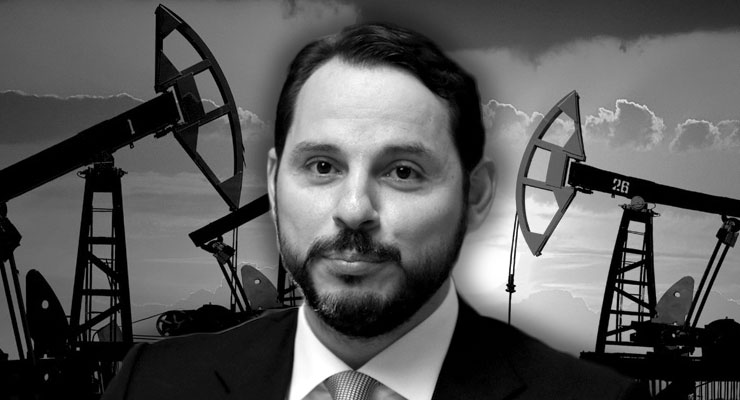
In his book ‘Potus and Beyefendi’, Turkish newspaper Hürriyet’s Washington DC correspondent Tolga Tanış revealed that a company named Powertrans was authorised in 2011 to transport oil produced by the Kurdistan Regional Government of Iraq.
According to the documents published, President Erdogan’s son-in-law Berat Albayrak was one of the shareholders of Powertrans.
Based on Tanış’s book, Turkish newspaper Cumhuriyet published an article on 12 March 2015, entitled “Oil favours to Erdoğan’s son-in-law, the new Energy Minister”.
The news article, later censored, detailed the following:
“On the documents revealed, Turkey’s rapprochement with the Kurdish Regional Government has financial significance for a few ‘selected companies’.
“Erdoğan’s cabinet, at their first meeting after the 2011 general election [which Erdogan’s party, the AKP, won in a landslide], issued a privileged order for the transport of oil from the region.
“The company which benefited the most was Powertrans, whose owners were not public. The documents show that the company belonged to Çalık Group. All the business decisions about the foreign owners of Powertrans, Grand Fortune Ventures and Lucky Ventures, were signed by Sovereign Trust Advisors, but they were taken by Çalık Holding executives when Erdoğan’s son-in-law Berat Albayrak was the [Çalık] CEO.”
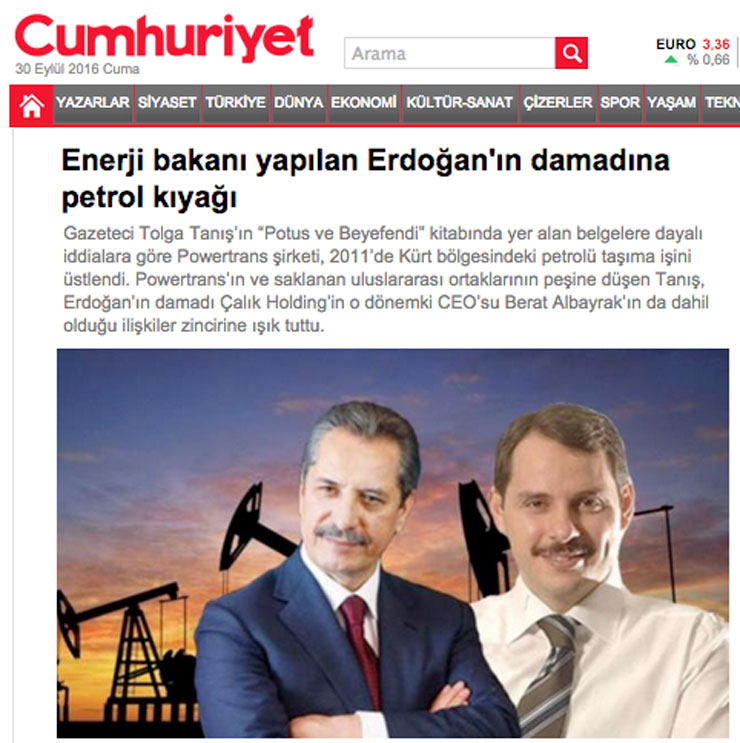
After the publication, Albayrak’s lawyers claimed he had no links to the company and filed a law suit against Cumhuriyet’s chief editor Can Dündar.
When Powertrans was founded, Berat Albayrak did not hold a ministerial position. But after he was appointed Energy Ministry, he released a statement on the Ministry’s website.
“Companies that applied for oil trade (petroleum, related products, natural gas or electricity) based on the contract laid out by the Northern Iraq Regional Government had received licences according to regulations of the government bodies.
"The application by PowerTrans was evaluated and approved by the Ministry of Customs and Trade according to international trade and Turkish regulations, on the condition that the company meets all the criteria completely. As a state governed by the rule of law, it is not possible for our government to give privileges to any person, company or institution illegally or immorally.”
In one of the correspondences, an employee named B.Y. [name redacted by reporter] asks Albayrak’s approval for the personnel employed and the food the workers receive.
In the email dated 20 June 2013, B.Y. asks “Powertrans wants the travel allowances to be reconsidered... and the food allowances to be increased by 5 Turkish Lira in parallel with other companies in the proximity [of ours]. Submitted for your approval.”
In another email leaked by RedHack, date unknown, B.Y. asks: “Dear Mr. Albayrak, the personnel you approved are appointed as follows: E.Y. as senior advisor to trade department with 1,500 Turkish Lira salary, M.E. as senior advisor to logistics department with 1,500 Turkish Lira salary…”
The email dump also contains the correspondence between Albayrak and D.A.İ. [name redacted by the reporter] ‘Iraq Regional Manager’ of Powertrans. In one email, D.A.İ. says: “After the Energy Ministry allowed gas and diesel oil for private companies, the ministry’s pressure on us is decreased. The final destination for the most part of the oil we transport is the Zaho region.”
D.A.İ. also warns Albayrak that if Barzani steps down from his presidency, their business may suffer.
He says: “Politically speaking, President Masoud Barzani’s term will soon be over. Previously, his term was extended by the decision of the Parliament. The new president was expected to be from the Iran-ally Goran (Change) Party, but after the meeting with Goran leaders with Iranian officials in Sulaymaniyah, they made a statement to support the extension of Masoud Barzani’s presidency.
“According to the intel from local sources, Masoud Barzani’s leave from office would have a huge impact. It is believed that the trade with Turkey would have decreased and the oil trade would have shifted to Iran.”
After millions of eggs have been withdrawn from supermarkets in the Netherlands and Germany over fears they contain a toxic insecticide, a Romanian connection to the scandal is now revealed.

Millions of eggs across retailers in northern Europe have been withdrawn from shelves over fears of their contact with a toxic insecticide, in a case now involving Romanian veterinary product companies, FarmaVet and Pasteur Romania.
The scandal began when Netherlands based farming company Chickfriend, through its Belgian supplier Poultry Vision, bought a substance in 2016 that contains the controversial insecticide Fipronil, to use for treating lice in chicken farms.
However the product is toxic and hazardous to health in large quantities - so should not be sprayed on products destined for the kitchen table.
An investigation is now ongoing.
An invoice below - seen by Dutch Newspaper NRC and The Black Sea - from 8 May, 2016, shows that a Patrick R. placed an order with veterinary supplies company Farmavet in Bucharest for transport of goods to Belgium's Poultry Vision.
.jpg)
He bought 3,000 liters for 108,000 Euro of Fiprocid, a product understood to be manufactured by Romanian company Pasteur Romania, as an insecticide. This contains ten per cent of the active ingredient, Fipronil.
Three months later, Patrick R. mailed representatives of both Romanian companies about a larger order.
"Hello Patrick," writes Farmavet's commercial director Lucian Gabor on August 11, 2016. "We are trying to find a solution for fiprocid."
Farmavet's proposal is that the businessman first orders 5,000 liters, and two weeks later Patrick R. could buy another 10,000 liters of Fiprocid.
The director is "urgently" waiting for his answer, "because I have to start production".
Whether the order actually took place is not known [the commercial director did not reply to an email request for an explanation].
However, last Tuesday, 6,000 liters of Fipronil was found in a warehouse belonging to Patrick R. in Belgium.
We also have documents which show that a Patrick of Poultry Vision also sold 6,508 Euro worth of a product called 'fypro-rein' to Chickfriend, a key source in the outbreak scare.
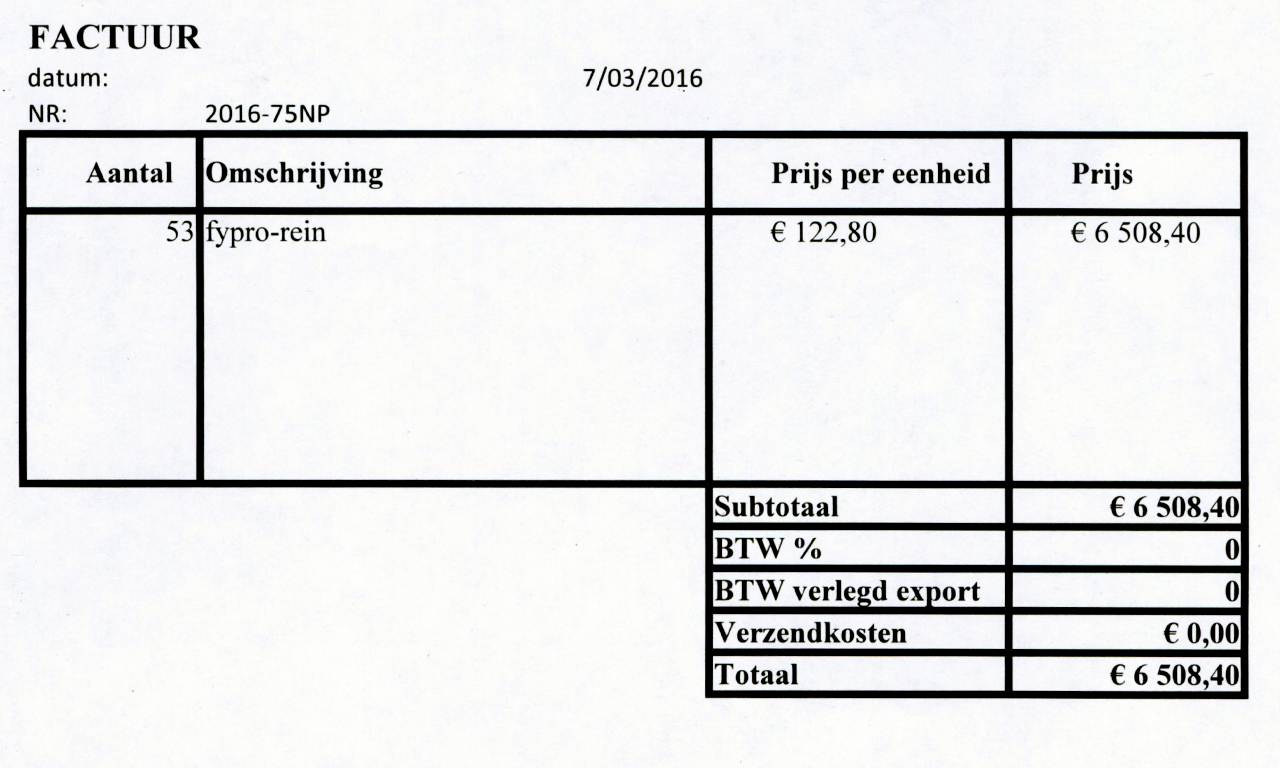
This week, German retailers Aldi withdrew all of its eggs from stores on Friday, after German officials said up to three million eggs were at risk in Germany.
This follows the temporary closure of 138 Dutch poultry farms - a fifth of the total number in the country - due to the Fipronil scare.
The fear is that an insecticide could pose a threat to children. The WHO has declared that the insecticide is “moderately hazardous” to human health - and high doses can lead to nausea and dizziness.
In general, Fipronil is used as a component in animal health products to combat fleas and ticks on dogs and cats.
Bucharest company Pasteur Romania has manufactured a product, Fiprocid, as an insecticide, which is now no longer available on the market. The company also continues to advertise the sale of Fipronil in its flea-busting product Spor Forte, for dogs.
The brand Pasteur Romania includes the state-owned producer of veterinary immunological products SN Pasteur Institute in Bucharest, and the private Pasteur, Filipesti Branch, a veterinary medicine factory in Prahova county.
We tried to contact Pasteur representatives by phone and email, but we received no answer.
"Fipronil should not have been used in chickens,” says Leif Miller, CEO of Germany’s environment association Nature And Biodiversity Conservation Union (NABU). “That a new scandal comes to us, however, is not surprising - and he will not be the last. It is only when the EU fundamentally changes its agricultural and nutritional policies that scandals such as this will be prevented.”
NB: This article has been corrected to outline the precise nature of the relationship between Patrick R, Chickfriend and Poultry Vision
30 year-old Uzbekistan journalist Ali Feruz is on the verge of deportation from Russia, and risks torture in the Central Asian country
The journalist is homosexual - a crime in Uzbekistan - and has previously been beaten up by the Uzbek authorities
UPDATE: Following a decison of an appeal court in Moscow on Tuesday 8 August, the deportation of Ali has been suspended until a final decision by the European Court of Human Rights. Ali will be kept inside a deportation center in Russia until then
.jpg)
A Russian journalist from newspaper Novaya Gazeta is on the verge of deportation to Uzbekistan, where journalists and their families risk imprisonment and disappearance.
On 1 August, a Russian court ordered the compulsory deportation of 30 year-old Ali Feruz, who was previously tortured by the powerful Uzbek security services, the SNB.
His colleagues believe the deportation could put his life in danger because he is a journalist, a profession brutally suppressed in the Central Asian country.
Feruz is openly gay, and in Uzbekistan sex between men is illegal and can be penalised with up to three years in prison.
He is registered as an Uzbek citizen, but has made a life for himself in Moscow for the last six years.
His deportation is part of a ‘fast-track’ deportation measure, although the legal means allowing his appeal have not yet been exhausted.
Vladimir Putin himself has been solicited by Novaya Gazeta editor in chief Dmitry Muratov to prevent the deportation of Feruz.
An independent republic since breaking free from the USSR in 1991, Uzbekistan is southeast Asia’s most populous state - of 32 million people.
From 1991 until 2016, it was run by President Islam Karimov, and was known an authoritarian state where torture and arbitrary detention were widespread, and the media was under constant attack.
If journalists wrote critical investigations into the leaders and their entourage, they risked torture and imprisonment. If these journalists were outside the country, their families in Uzbekistan also faced reprisals.
Karimov even imprisoned his own nephew Jamshid, an investigative journalist, in a psychiatric facility, where he remained from 2006 until this year.
Since Karimov’s death, the new President Shavkat Mirziyoyev has made signals towards a thaw in media freedom and human rights.
But Mirziyoyev comes from the same elite as his predecessor and the power structures remain in place in a secretive country where the mighty security service, the SNB, is a powerful player within the state.
Ali Feruz is the pen name of Khudoberdi Nurmatov, who has written on hate crimes, LGBT and disability rights, and the rights of refugees from Central Asia.
Born in Kokand in the Uzbek Soviet Socialist Republic in 1987, Feruz’s mother is Russian and he graduated in Russia, only later acquiring Uzbek citizenship in 2004. In 2008, he married a Kyrgyz citizen, Dilafruz Shamshiddinova, and moved to Uzbekistan, where he fathered two children.
That year he was kidnapped by the security services, the SNB, who interrogated Feruz and forced him to hand over information about the political views of his friends who practised Islam.
The SNB also asked Feruz to work for them. After refusing to cooperate, the journalist was beaten by members of the SNB, who threatened to rape his wife and imprison him on false information.
He then fled to Kyrgyzstan, and then to Kazakhstan, before moving to Russia in 2011.
In 2013, he came out as gay, and broke up with his wife.
He has repeatedly been refused asylum by the Russian authorities, and in March 2017, the Russian police detained him for 12 hours on no charges. The police officers grilled him on the reasons for his application for shelter in Russia, and he was threatened with deportation to Uzbekistan.
There are cases where Uzbek asylum seekers - and even those with refugee status - disappear in Moscow and are later found in Uzbek prisons.
The staff at Novaya Gazeta fear that even if Feruz gains provisional asylum status in Russia, he could still be at risk of abduction and kidnap to Uzbekistan.
- The Turkish regime''s campaign against journalists is "nothing but a persecution against freedom of thought and expression" says investigative journalist Ahmet Şık, taking the witness stand in an Istanbul court
- He is on trial for eight tweets, five articles and one interview critical of the Turkish President Erdogan''s regime
- If convicted, he could face up to 15 years in jail
- "I was a journalist yesterday," he said. "I am a journalist today. I will be a journalist tomorrow. So the irreconcilable fight between myself and those who want to strangle the truth will never end."
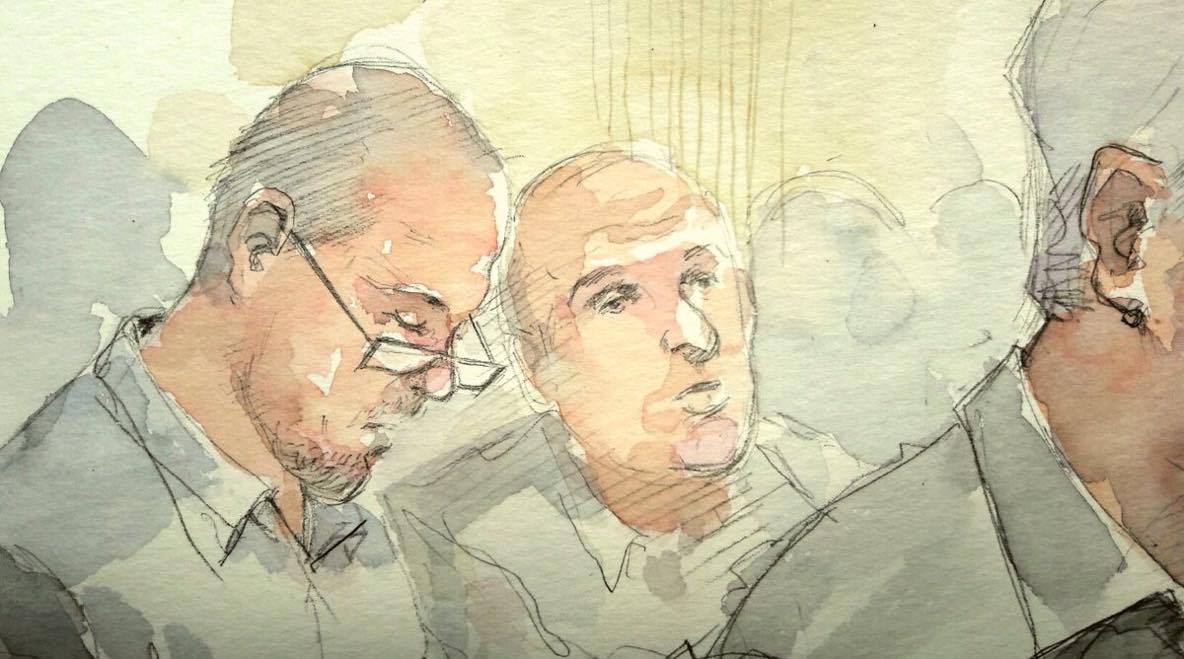
Turkish investigative journalist Ahmet Şık was in an Istanbul court today with 17 fellow employees of the oldest Turkish daily, Cumhuriyet.
This was Şık's his first day in court in the case for which he was arrested 206 days ago.
The Cumhuriyet journalists are accused of “aiding terrorist organisations" without "being a member” of those networks, and “employment-related abuse of trust”.
Şık is on trial for eight tweets, five articles and one interview.
The prosecutor has asked for jail time of seven-and-a-half to 43 years for the journalists.
If convicted, Şık may serve up to 15 years behind bars.
This is a summary of what he said:
“Once more, history is on our side. You won’t be able to make a terrorist organisation out of Cumhuriyet or a terrorist out of us.
"What I say here today is not my defence or my testimony. On the contrary, they are accusations. Because, this campaign against us is nothing but persecution against freedom of thought and expression.
"In democracies, the judiciary acts with international standards of law. However, some members of the judiciary in Turkey are the gravediggers of justice.
"What I say here is not a defence at all. Saying that would be an insult towards my journalism and ethics.
"Because journalism is not a crime.
"Totalitarian regimes have the common feature of criminalising journalism. I know from my experience that I managed to become the persona-non-grata of every [Turkish] Government from every political era. I am proud of this inheritance that I will leave my daughter.
"I know this Government and its judiciary also have problems with me. Because I’m trying to do journalism. Today, I’m practising journalism not with the power I get from the government but with the power I get from truth.
"I was a journalist yesterday. I am a journalist today. I will be a journalist tomorrow. So the irreconcilable fight between myself and those who want to strangle the truth will never end."
"What we need in these dark days is not the loss of truth. We need truth now more than anything. This is why I will continue respecting truth more than I respect myself and I will continue refusing to be part of those who deny [the truth]."
"But it is obvious that a price must be paid. But do not think for a second that this scares us. Neither I nor the [group] 'Journalists Outside' - whom I am proud to be a part of - are scared of you, whoever you are. Because we know the thing that scares tyrants most is courage.
"And the tyrants should know that no cruelty can prevent the progress of history. Down with tyranny, long live freedom.”
Some in the courtroom were in tears during the speech, while these last words received spontaneous applause. There was such commotion, the judge had to warn the court to keep quiet.
The prosecutor mentioned news articles that are the subject of the court case. But Sik defiantly replied that he was proud of writing them.
He mentioned that the statute of limitation for a news article in Turkey to be sued is four months, and suggested that the prosecutor should go back to law school to learn these intricacies of the media law.
At this point, the prosecutor had enough.
He replied to Şık:
“You have no right to lecture us, we are educated too. We have experience too.”
Şık answered: “Do not ask me questions with [hidden] intentions. Ask me questions.”
The prosecutor then asked Şık about his famous tweet where he said the state is a murderer.
Şık replied:
“I haven’t said enough. The state is a serial killer.”
The trial will last until Friday this week.
Other jailed defendants in the case are Akın Atalay, Murat Sabuncu, Kadri Gürsel, Turhan Günay, Güray Öz, Hakan Kara, Musa Kart, Önder Çelik, Bülent Utku and Mustafa Kemal Güngör, while another six are on trial without arrest or in absentia.
Ahmet Şık is charged with creating "propaganda for a terrorist organisation" and insulting the Turkish Republic, its judiciary, military and security forces.
It began last December when 46 year-old journalist announced on Twitter [below]: "I'm being detained. They're taking me to the prosecutor due to a tweet."
It has been seven months until his case was brought to trial.
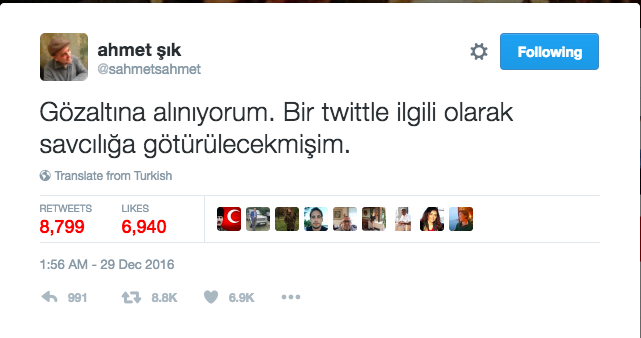
Several of his tweets are now being used as "evidence" that Ahmet created propaganda for the PKK (Kurdish Workers’ Party), DHKP-C (Marxist-Leninist terrorist organisation) and FETO (Fetullah Gulen Terrorist Organisation). FETO is the name given to a 'network' organised by a exiled former cleric, Fetullah Gulen, whose followers were deemed responsible for the failed coup against Turkish President Erdogan's regime in July 2016.
This last allegation is bizarre, as Şık has been one of the staunchest critics of Gulen and his Islamist sect, and even wrote a book exposing their organisation.
Ahmet is now held under the Turkish government's state of emergency powers, adopted following the failed coup.
This decree is being exploited by the state to jail dozens of journalists, academics and lawyers, as well as the closure of human rights organisations.
According to a 2016 report by the Journalists’ Association of Turkey, in 2016, 780 journalists had their press cards revoked, 839 journalists were brought before court over news coverage.
Now many hundreds of journalists are in jail - making Turkey a 'gulag of the free press'.
Ahmet was arrested over several tweets he made between late November and early December 2016.
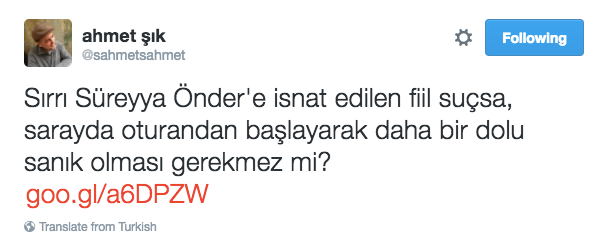
Tweet 1: "If Sirri Sureyya Onder is guilty of these charges, then don’t many people including the ones sitting in the [Presidential] Palace need to be charged too?"
Onder, MP for the People's Democratic Party (HDP), a pro-Kurdish political party with seats in the Turkish parliament, was detained in November for terrorism-related charges because of a photograph taken of him with a member of the PKK's media team.
The HDP, however, were part of the group negotiating a peace deal between the Government and PKK, which also including members of AKP - hence the questioning tone of Şık's tweet.
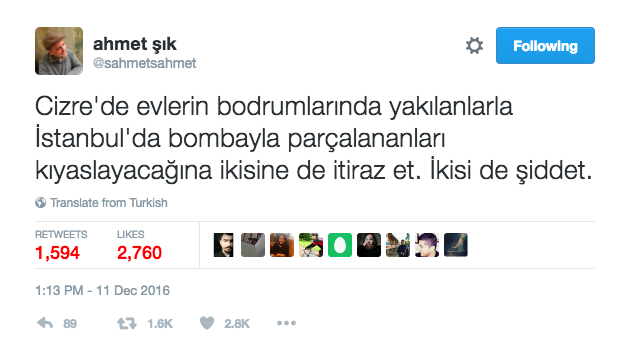
Tweet 2: "Instead of comparing people burned to death in Cizre and people blown up in Istanbul, why don’t you get angry about both of them? It's violence either way."
In February last year, 60 people burned to death in an apartment basement in Cizre, southeast Turkey, when they took shelter during Turkish army bombing campaign against the PKK.
The military claimed it "neutralised" several PKK soldiers, but others, including HDP members, said civilians were among those killed.
Hence Şık's appeal to moral equivalence, which he makes at the same time as not condoning either terrorism or Government-backed arson.
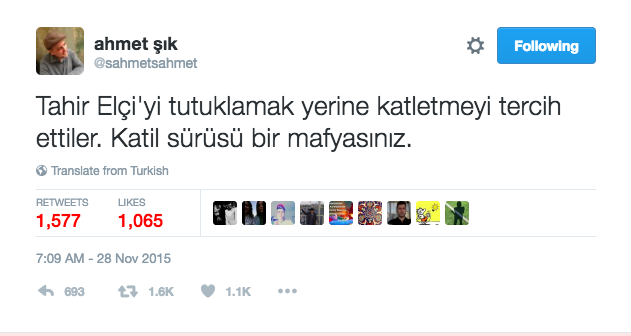
Tweet 3 "Instead of arresting Tahir Elci [lawyer] they chose to murder him, you are a murderous mafia."
Elci was a human rights lawyer who defended the rights of Kurds in Turkey.
He was shot and killed in November last year moments before being due to issue a press statement calling for an end to the violence in the south east of the country.
No one has been arrested for the assassination, but the family and some HDP members blame the Government.
In 2011, Ahmet was previously jailed for 375 days, along with fellow journalist Nedim Sener.
They were accused of being members of a so-called terrorist organisation called "Ergenekon", which the AKP said was plotting to overthrow the Government.
Ahmet's unpublished book, 'The Imam's Army', about the infiltration of Turkey's institutions by followers of Fetthulah Gulen caused his prior arrest.
In 2014, the European Court of Human Rights ruled that the Turkish government violated the rights of Ahmet and Sener.
Two years later, Turkey's supreme court quashed the Ergenekon convictions, stating that the prosecutor - who fled Turkey last year - failed to establish that the 'terrorist organisation' had ever even existed.
- Editor of Turkish newspaper Evrensel is under investigation by public prosecutor over allegations he "insulted the President" by republishing an article by The Black Sea on the business dealings of Turkish President Erdogan''s family
- The journalist is under fire for asking the question: “What does the Erdogan family say about these allegations?”
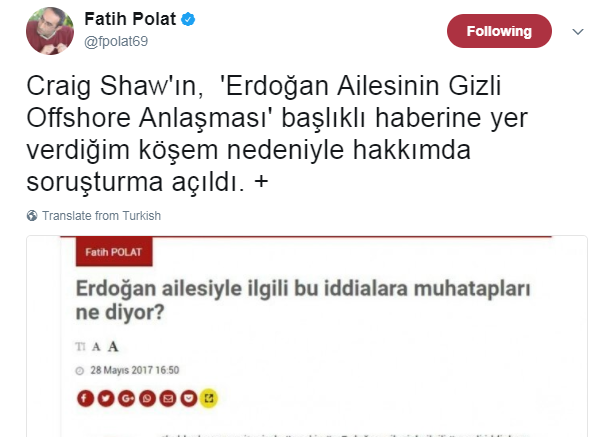
A Turkish prosecutor has launched an investigation into the editor of left-wing daily newspaper, Evrensel, over a report he re-published by The Black Sea about the secret financial affairs of the Erdogan family.
The Turkish President's lawyer lodged a complaint against editor Fatih Polat, who faces the charge of "insulting the president", a criminal offense in Turkey. This is one of the most common legal tools utilized by Erdogan and his government to silence his critics and attack free journalism.
On 28 May, Polat published a column on the paper's website titled “What does the Erdogan family say about these allegations?”. It included the full text of the #MaltaFiles investigation published two days earlier that revealed how two rich Turkish businessmen close to the president paid 25 million USD for an oil tanker secretly owned by the family's offshore company.
The news organisation was ordered by an Istanbul court to remove the column, and they soon filed an appeal against the decision. Two days ago, lawyers announced their motion had been rejected by the Turkish court of appeals.
The legal justification for this was a single line:
“The appeal is to be rejected.”
The news magazine pledged to fight the issue in the Consitutional Court. But now Polat also faces a lenghty criminal process, which could take years to resolve.
- UPDATE: Editor of Turkish newspaper Evrensel is being investigated by public prosecutor over allegations he "insulted the President" by republishing an article by The Black Sea
- The news site is battling a court decision to censor report on business dealings of Turkish President''s family, first published in The Black Sea
- Press freedom faces new attack from the Turkish judiciary as any news story against the Government "faces an immediate takedown order"
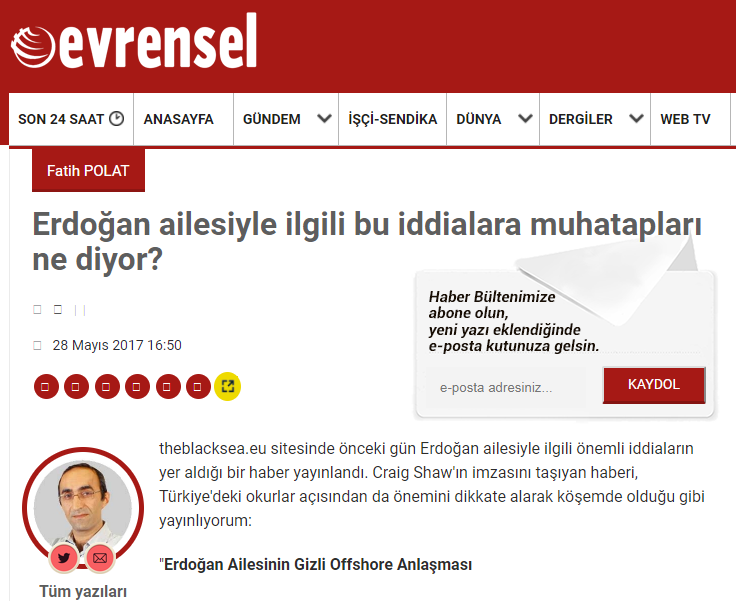
Left-wing Turkish newspaper Evrensel is planning to fight a case in the country’s highest court against a gag order demanding it removes content from its website detailing the The Black Sea's report about the secret business dealings of President Erdogan's family.
On Tuesday 11 July, the publication lost an appeal to keep the article's contents online in a court decision that came with no legal justification.
Evrensel’s lawyer Devrim Avci fears this is setting a dangerous precedent for media freedom.
“Any article, critique, news story that is against the Government faces an immediate takedown order,” she said in a statement. “These orders come so fast, that there will be nothing on the web criticising the Government. This is very dangerous for the freedom of the press.”
The #MaltaFiles story, which details the Erdogan family’s hidden of ownership of a 25 million USD oil tanker, was originally published by EIC members in late May.
Evrensel’s editor, Fatih Polat, republished the article in its entirety with the title “What does the Erdogan family say about these allegations?”
The Istanbul 14th Penal Court of Peace then issued an order shortly after, at the request of a state prosecutor and an as-yet-unknown complainant, forcing the paper to remove the story from its website. Then access to the specific web address of the article was blocked by the Information and Communication Technologies Authority (ICTA), a body which censors the internet in Turkey.
The court provided no details on what legal grounds it took its decision to issue a take down order against Evrensel. It occurred around the time that another Istanbul court issued an order blocking stories on the blacksea.eu site revealing the wealth and assets of Prime Minister Binali Yıldırım’s family. This injunction was made at the request of the Yıldırım family lawyer.
Evrensel challenged the gag order in the Court of Appeal, but on Tuesday 11 July the court denied the media's request to lift the ban.
Again the court gave no arguments for its decision, and instead issued a one-line statement:
“The appeal is to be rejected.”
The website claims that the Turkish courts are greenlighting all requests from Erdogan and his closest political allies - the Justice and Development Party (AKP) - without using legal arguments.
In a statement issued on its website, Evrensel’s lawyer Devrim Avci said:
“With this last verdict, the ruling is final, which means the content will be removed. This is how the courts work, they work to obstruct justice. They rule, then you appeal and they reject your appeal with only one sentence, and without any legal reasoning… If the request comes from the government or people close to the government, these content removal requests are automated. No appeal is ever accepted.”
This is in stark contrast with the official line of the President. In a recent interview with German newspaper Die Zeit, Erdogan stated: “Our judiciary is independent…And we are talking about an independent judiciary, an impartial judiciary. And it does what the constitution of the Turkish Republic and its laws require of it.”
Evrensel says it now plans to take its case to the Constitutional Court, Turkey’s highest judicial body, to argue that the Turkish public has a right to know about the secret financial dealings and wealth of Turkey’s politicians and business elite.
The appeal is an important test case for freedom of speech. It will show the courts’ ability to uphold the law and act independent of Turkey’s president. At the same time, it will offer insight into the current state of the country’s press after years of Erdogan's aggression, which intensified after last year's failed coup against his leadership. Now Turkey is the country with the highest number of jailed journalists in the world.